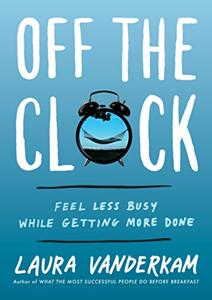
Want to learn the ideas in Off the Clock better than ever? Read the world’s #1 book summary of Off the Clock by Laura Vanderkam here.
Read a brief 1-Page Summary or watch video summaries curated by our expert team. Note: this book guide is not affiliated with or endorsed by the publisher or author, and we always encourage you to purchase and read the full book.
Video Summaries of Off the Clock
We’ve scoured the Internet for the very best videos on Off the Clock, from high-quality videos summaries to interviews or commentary by Laura Vanderkam.
1-Page Summary of Off the Clock
Overview
Many people feel overwhelmed with being busy. They’re always on their phones and getting emails that they need to respond to, as well as domestic duties that are also important. When they do have time for themselves, they often worry about not accomplishing anything or what’s next on the agenda.
In order to create a productive and enjoyable life, we must understand why some people feel as though they have all the time in the world while others never seem to have enough. We can do that by learning how modern workplaces developed cultures of busyness, which has led us to monopolize our free time with meaningless meetings. Furthermore, we will learn what you can do right now to feel less busy and get more done.
In these points, you’ll learn how to spend more time with your family and friends so that you can extend the amount of time in your life; why creating memories will make it seem like you have more time than you actually do; and what your expectations about having enough time will affect how much work gets done.
Big Idea #1: Learn exactly what you’re doing with your time, even if it scares you, by keeping a log.
The author of this passage is obsessed with time. She’s spent years logging how much time she spends on different activities, and she can tell you that on a certain day in the past, she got up at 6:45 a.m., did some paperwork from her child’s school for 45 minutes, and later dealt with her mail for 30 minutes.
The author thought she was working as much as she said. However, after keeping a log of her time for a week, she saw that it wasn’t true. She had been underestimating how many hours she worked and overestimating how hard other people were working. This is common among people who say they work more than 40 hours per week but actually work about 40 hours per week on average. In 2011, the Bureau of Labour Statistics conducted a study in which they found that most people who claim to work 75 or more hours per week are really only working 50 to 60 hours per week on average.
Many people don’t want to know how they spend their time. They are afraid that if they track it, they will see that they are wasting too much time on things like social media or watching TV. People may also worry about feeling anxious about spending each moment of life wisely.
The author found that time tracking can be helpful, but it also has its downsides. After years of tracking her time, she was able to make positive changes in how she spent her days.
For example, once she realized that she was spending almost 3 hours per week reading trashy magazines, she became motivated to plan her time better and read more books. She made lists of good books and scheduled time to buy them instead of wasting her time on celebrity gossip.
Big Idea #2: Make your hours memorable by filling them with exciting moments.
We all have memories, both good and bad. These memories shape the way we see ourselves today. Also, our memory plays an important role in how we perceive time. The more memories you make, the longer you feel your life has been. This is because of how our brains process information and store it away for later use.
As we go through our daily lives, much of what happens to us is quickly archived in the depths of our brain or forgotten completely. For instance, can you remember what exactly you did on today’s date three years ago? If something particularly noteworthy happened that day, then perhaps you can recall it. However, if it was a routine day like any other and nothing special happened, then most likely you would not be able to remember that day at all. This is because we do not think about our established routines very often. In fact, this lack of thought makes our routines feel comfortable and familiar.





